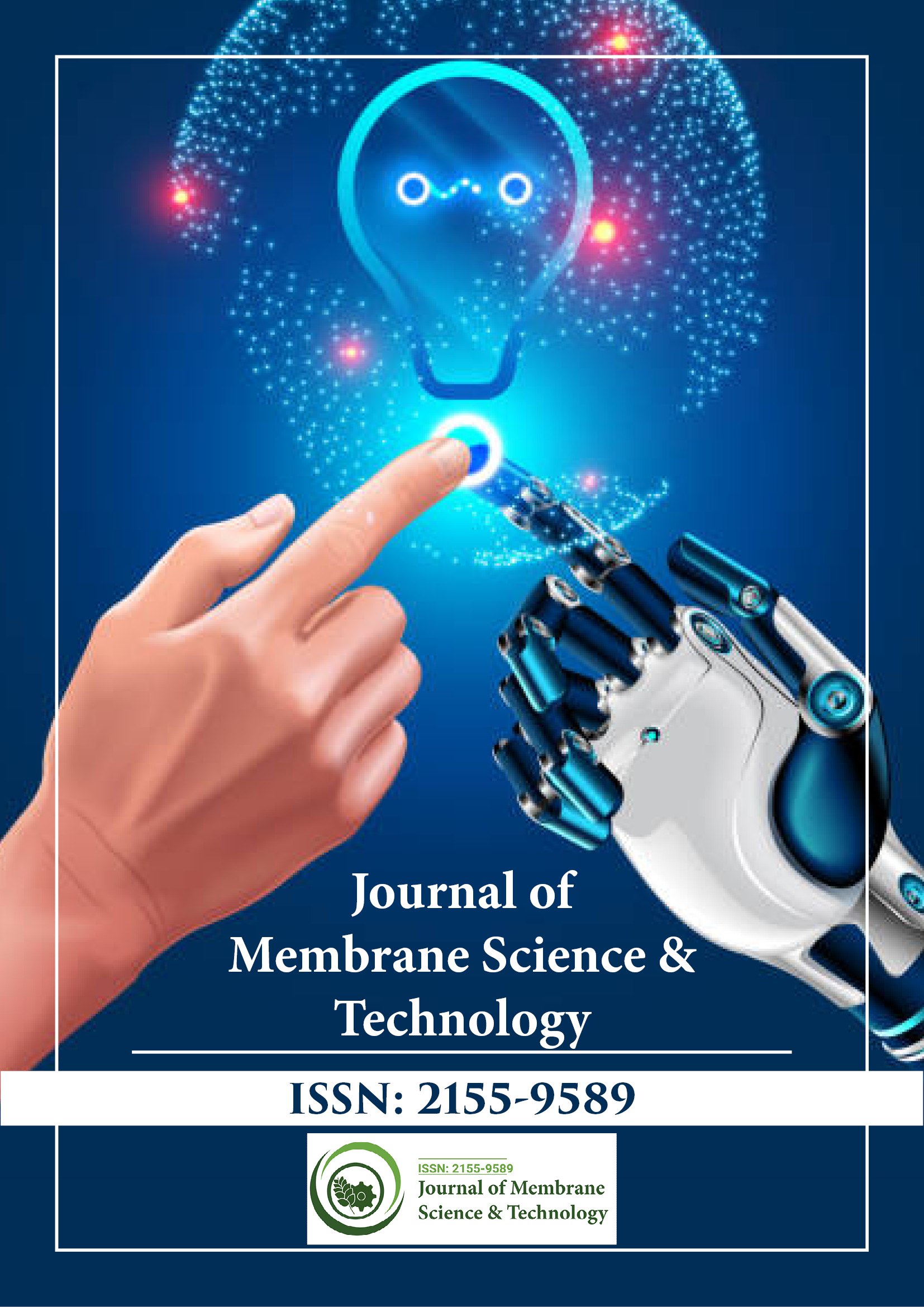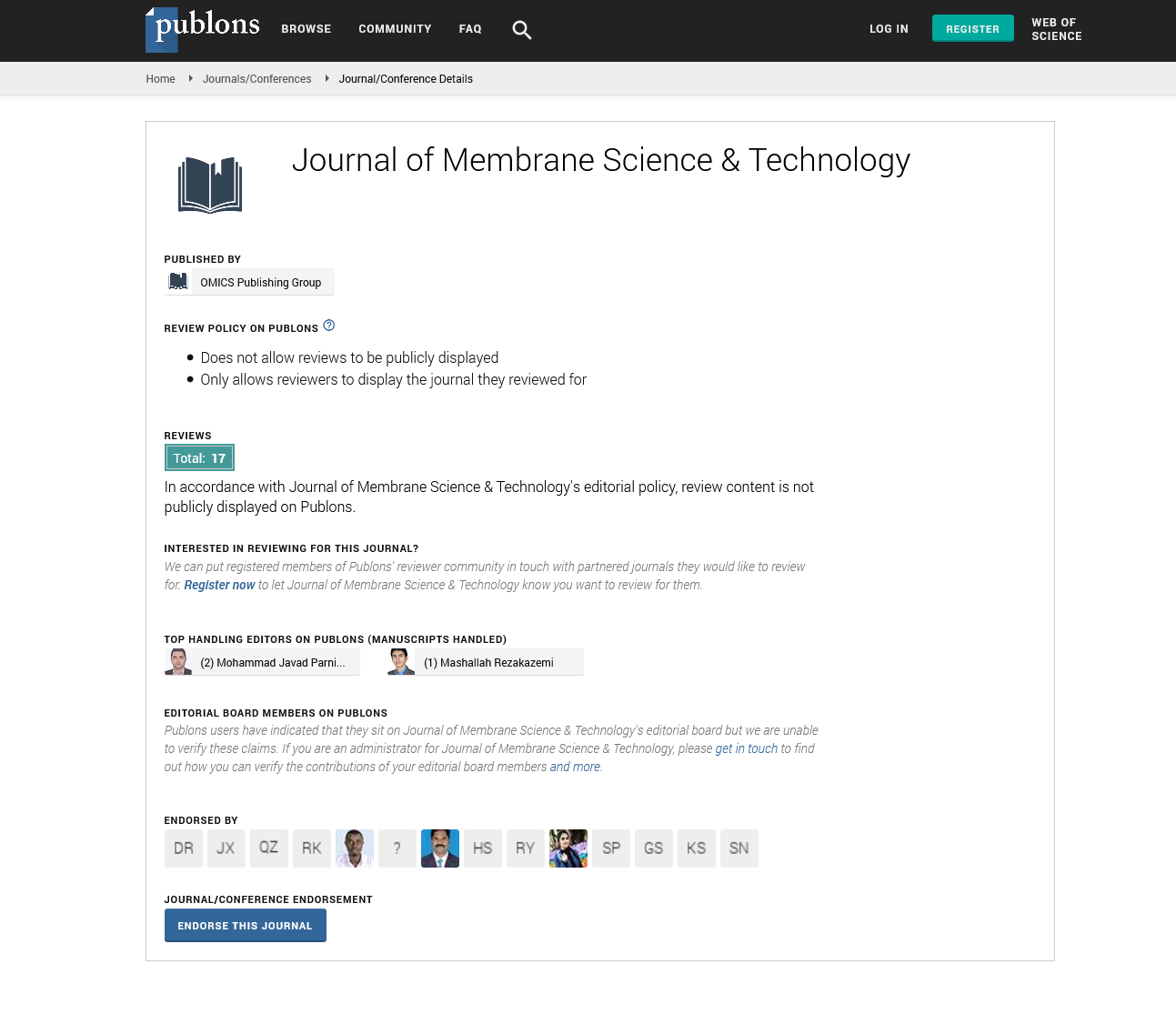Indexed In
- Open J Gate
- Genamics JournalSeek
- Ulrich's Periodicals Directory
- RefSeek
- Directory of Research Journal Indexing (DRJI)
- Hamdard University
- EBSCO A-Z
- OCLC- WorldCat
- Proquest Summons
- Scholarsteer
- Publons
- Geneva Foundation for Medical Education and Research
- Euro Pub
- Google Scholar
Useful Links
Share This Page
Journal Flyer

Open Access Journals
- Agri and Aquaculture
- Biochemistry
- Bioinformatics & Systems Biology
- Business & Management
- Chemistry
- Clinical Sciences
- Engineering
- Food & Nutrition
- General Science
- Genetics & Molecular Biology
- Immunology & Microbiology
- Medical Sciences
- Neuroscience & Psychology
- Nursing & Health Care
- Pharmaceutical Sciences
Management of stormwater by ultrafiltration
2nd International Conference on Membrane Science and Technology
September 13-14, 2018 | London, UK
Vandre Barbosa Briao
The University of Passo Fundo, Brazil
Scientific Tracks Abstracts: J Membr Sci Technol
Abstract:
Stormwater has become an issue of concern in urban centers. The transport of pollutants (oils, organic liquids, fertilizers, nutrients, and heavy metals as Cd, Cu, Pb) by stormwater runoff over impermeable surfaces (parking lots, roadways, and so forth) can carry a wide range of contaminants into the surface water, groundwater and soils and can affect the public health and the environment. The use of stormwater in non-drinking applications could be an interesting way of addressing these large volumes of water. Rainwater has become an important resource, not only in low-volume storage areas, but also in areas where the reduction of treated water consumption by local supply is desirable. Rainwater harvesting usually uses roof as catchment surface, but the ground offers a larger area to harvest water. Microfiltration (MF) and ultrafiltration (UF) are used to treat industrial wastewater and process water. MF removes particulates and bacteria. UF can remove suspended and colloidal solids, macromolecules, bacteria, and viruses. Thus, both membrane processes have been used to treat rainwater catches on rooftops and surface water on a limited scale but with promising results; but the question is: Are MF and UF able to produce water with required quality from stormwater? This study evaluates stormwater management for use in non-potable activities and pollution control by MF and UF. Stormwater was sampled in a parking lot. The permeate flux and removal rates of both membranes were evaluated in continuous operation tests. Permeate quality was compared to American, Australian, Spanish, and Brazilian guidelines. Both MF and UF membranes allow the adjustment of stormwater quality for toilet flushing and fire protection, and they have good performance in controlling pollution. UF has a better operation and removal performance and might be complementary with best management practices to obtain an overall better efficiency. Recent Publications 1. Miorando T, Brião Vandré Barbosa and Girardelli L (2017) Ultrafiltration of rainwater to produce drinking water. Eng. Sanit. Ambient 22(3):481???490. 2. Einehr Christian Oliveira, Treichel Helen, Tres Marcus Vinicius, Steffens Juliana, Brião Vandré Barbosa, et al. (2017) Successive membrane separation processes simplify concentration of lipases produced by Aspergillus niger by solid-state fermentation. Bioprocess and Biosystems Engineering 1:1???13. 3. Vieira Salla Ana Cláudia, Margarites Ana Cláudia, Seibel Fábio Ivan, Holz Luiz Carlos, Brião Vandré Barbosa, et al. (2016) Increase in the carbohydrate content of the microalgae Spirulina in culture by nutrient starvation and the addition of residues of whey protein concentrate. Bioresource Technology 209:133???141. 4. Seguenka B, Brião Vandré Barbosa, Silveira C, Salla A C, Milani A, et al. (2015) Clarification of red wine by membrane separation processes. Global Science and Technology 7:119???126. 5. Brião Vandré Barbosa, Pandolfo A, Hemkemeier M, Brião Edesnei Barbosa and Favaretto Danúbia Paula Cadore (2015) Economic assessment of the desalination of the guarani aquifer system by reverse osmosis to produce potable water in Southern Brazil. Desalination and Water Treatment 58:1???12.
Biography :
Vandre Barbosa Briao is Food Engineering and PhD in Chemical Engineering in Membrane Separation Processes. As an Engineer, he was the operator of a RO system for water desalination in a dairy industry. Professor at The University of Passo Fundo since 2000, he has researched MF/UF/NF/RO in food and water/wastewater applications. His goal has been the reuse of water and his research has been focused on the post-treatment of water/wastewater with hybrid systems by coagulation-electrocoagulation-adsorption coupled with membrane separation.
E-mail: vandre@upf.br

